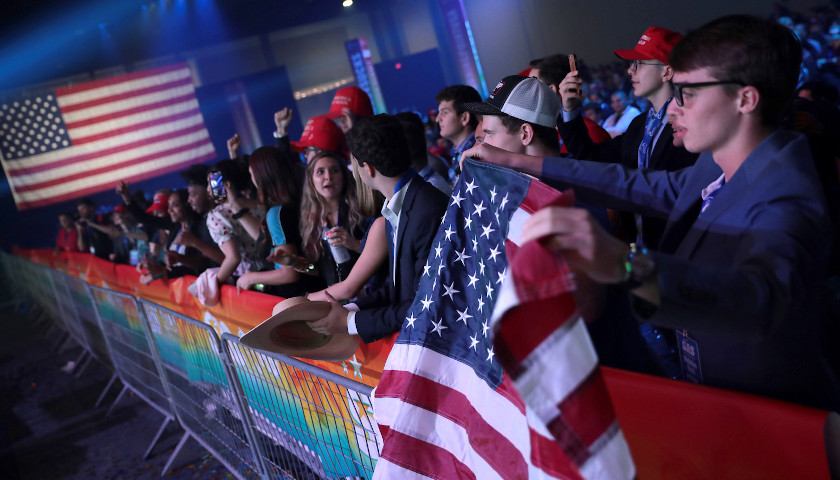by Thaddeus G. McCotter
A modern populist movement with the twin goals of expanding individual liberty and strengthening the bonds of community exists as a result of a communications revolution that has empowered people to control their own lives. That’s good news. The danger, however, is that the new populism will succumb to the old temptations of collectivism—a devolution made possible by the conflation and prioritization of virtual community over traditional community.
There is a segment of our citizenry whose yearning for traditional community is often misunderstood, largely because it is filtered through the vocabulary of the Left in which they’ve been indoctrinated. They’re also susceptible to the fallacies and pitfalls of virtual community.
Millennials and post-Millennials (“Zoomers,” as they’re sometimes called) are often maligned as callow, self-absorbed ne’er-do-wells occupying their parents’ basements and, between bouts of video gaming, littering cyberspace with selfies and virtue signals as they await internet celebrity and their universal basic income check. Such calumnies often stem from the reaction a more responsible citizenry has toward the partisan jackanapes the Left and their media cohorts shove to the fore as “America’s future.”
Still, many mistakenly apply this characterization to the vast majority of those whom Russell Kirk would describe as today’s “rising generation.” While this broad-brush painting is unfair, the assessment is understandable.
Having grown up with the internet, the rising generation tends to be oblivious to the empowerment it affords them. They’ve never known a world without it. This sense of things is exacerbated by the abject failure of educational institutions to teach civics and history and, instead, prefer to indoctrinate students with left-wing regressive ideology. Given that, the rising generation knows little about their rights. Compared to previous generations, today’s young Americans have more rights but have much less knowledge about how to protect them. Only a rising generation living in a world of incessant, instantaneous communication could so cavalierly curb their free speech to pay the cover charge for a campus “safe space.”
Further, the rising generation has grown up with virtual community at the very time traditional community’s voluntary mediating institutions between the individual and the government have been under assault by the administrative state. This has contributed to the rising generation’s susceptibility to the allure of collectivist schemes.
Coming of age in the era of social media has led to a more global outlook than that possessed by previous generations, which might have been a healthy development had it not also frayed their patriotic bonds to their country and traditional community. (Yes, some cosmopolitan American poseurs like to claim to be “citizens of the world.” But, when they wind up in a Turkish prison, they call the U.S. embassy, not the United Nations.)
Another contributing factor in the rising generation’s confusion is contemporary child-rearing practices, such as “helicopter parents” who regiment and micromanage their children’s daily lives down to the moment. Adults raised by such parents are far more prone than previous generations to accept government intrusions into increasing areas of their lives. Put another way, coddled children make for model citizens in the nanny state. Many see this submissive trait manifested in how the rising generation overwhelmingly votes for and identifies with the Democratic Party—the host of the collectivist strain in the American body politic.
Yet, behind this veneer, one can discern the majority of young Americans’ attitudes are decidedly not what they appear.
Technologically savvy, the rising generation is leveraging cyberspace for entrepreneurial pursuits, be it as a primary or as an added source of income. They have long ago learned to monetize their brands and business interests on eBay, Amazon, Facebook, YouTube, and a plethora of platforms. Yet their entrepreneurship is not bounded by cyberspace.
Sensing the absence of the full measure of traditional community other generations experienced, the rising generation has flocked to revitalize economically distressed and disadvantaged urban and interior suburban downtowns. They have a passion for restoring and conserving older buildings and vintage items, and have a thirst for the history behind them. Given the myriad merchandise on offer, the creativity of its marketing, and the sheer resolve and resilience of the rising generation of innovative American entrepreneurs, it impossible to ignore their inspiring and needed example.
Further reaching for a sense of shared traditional community, the rising generation desires locally sourced products and ones made by artisans, while eschewing mass-produced products sold by chain stores and multinational corporations. The rising generation doesn’t just prize “authenticity” in its products; it also prizes it in people. And there is nowhere better to discern authenticity than in daily engagements of a traditional community, where one can talk person to person, neighbor to neighbor, eye to eye.
Believing small is beautiful and taking advantage of the individual empowerment provided to them by the communications revolution, the vast majority of the rising generation is employing the tools of virtual community to forge stronger bonds of a new kind of traditional community. In sum, the rising generation is replete with intuitive populists.
Yes, the majority of the rising generation would bristle at the designation. Many self-proclaimed populists would bristle at it as well, citing polls showing the rising generation’s failure to abhor socialism or even Communism. But such polling measures their attitudes toward an abstract ideology they scarcely understand and one they’ve been indoctrinated into believing is beneficial.
By their deeds, if not by their words, the rising generation is far from mere cannon fodder for collectivists. What is more revealing is that when the rising generation is polled regarding specific policies, they are decidedly more inclined to favor Republican ones—so long as those policies are not identified with the GOP.
And therein is the rub for both the rising generation and Republican populists: Why are the majority of young Americans, especially, and too many Americans generally, supporting a Democratic Party that is hell-bent on destroying both individual liberty and the bonds of traditional community that they seek?
It is because populists, especially those in the Republican Party, have failed to fully embrace and cogently articulate the one concept that links everyone seeking to strengthen personal liberty and the bonds of traditional community. And that key concept is . . .
Going to be revealed and explored in the conclusion of this series.
– – –
The Hon. Thaddeus McCotter is the former chairman of the Republican House Policy Committee, current itinerant guitarist, American Greatness contributor, and Monday co-host of the “John Batchelor Show.”
Photo “Young People” by Gage Skidmore. CC BY-SA 2.0.




